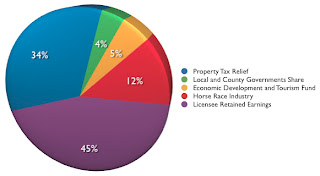When gambling was approved as a means for raising revenue in Pennsylvania the horse racing industry received a huge break. The Pennsylvania Race Horse Development Fund was created under the law to subsidize the breeding program of race horses in Pennsylvania. Read this article that appeared in the Reading Eagle.
Breeding thoroughbreds is, of course, nothing new in Pennsylvania.
But under a state-subsidized breeding program, infused with millions of dollars from Pennsylvania's casino revenues, the Broks get to share in the winnings of the horses they breed.
If any horse they breed finishes in the money - that is, wins, places or shows - at a Pennsylvania track, the Broks get a bonus from a pool of state money called the Pennsylvania Horse Race Development Fund.
So far this year, the Broks have received about $40,000 from the fund.
"Slots have benefited my business tremendously," Glen Brok said. "They've created a great atmosphere for breeding horses in Pennsylvania."
It's no accident that breeders such as the Broks find themselves in the winners circle.
The Pennsylvania Race Horse Development and Gaming Act, the legislation that legalized the state's 14 slots-only casinos, was aimed at reinvigorating the state's sagging horse racing industry.
Purses at Pennsylvania tracks were low, and Pennsylvania-bred horses were being overshadowed by those raised in New York, Kentucky and Florida.
That's all changed because of tax revenue from the slots.
Under the gaming law, 12 percent of gross casino revenues goes to an array of programs that underwrite various aspects of thoroughbred and harness racing in Pennsylvania.
Since the first casino opened in November 2006, slots revenues have pumped $295.3 million into the state's thoroughbred and harness racing industry, according to the Pennsylvania Gaming Control Board.
In 2007, the first full year of operation, the Pennsylvania Race Horse Development Fund received $128.5 million from casino revenues. As a result, purses at Pennsylvania race tracks escalated from $55 million to $144 million in 2007, a nearly 162 percent increase in one year.
Melinda Tucker, director of racetrack gaming, said the 2008 figures will give a clearer picture of the impact of slots on thoroughbred and harness racing in Pennsylvania.
The picture is pretty clear to Rich Miller, owner of Mountain Springs Arena near Shartlesville, where he runs thoroughbred auctions.
He said horse racing in Pennsylvania is doing great.
And, he predicted, it will get even better as the remaining eight casinos begin operations over the next several years.
"Purses are up, and they're going up again in January," Miller said.
"More stallions are coming into Pennsylvania, and more people are getting in the game," he said. "It's getting pretty lucrative now. The value of Pennsylvania-bred horses has about doubled."
That's pretty sickening given the major problems facing Pennsylvanians and Pennsylvania.
Look at this chart.
As a result of their 12% levy the horse racing industry in Pennsylvania has received $829,053,213,26 in revenues since 2006. Here is a link to the information.
Legislators are wondering how to fund our drastic highway repairs so sorely needed...duhhhhh.

3 comments:
what a great resource..
Pennsylvania gaming industry is taxed 55%+ of slot machine income.
Pennsylvania as a result receives more money from taxes on gaming than Las Vegas pays to Nevada.
This has lowered real estate taxes
and has been a source of economic benefit during recessionary times
beyond expectations. The Horsemens fund was reduced to 10
% of slot revenue and the thoroughbred horse business in PA has attracted quality horses that would otherwise have not been drawn to Pennsylvania. As other States have been drawn into competing for gaming revenue, Ohio for example, their gaming law states that 3% of slot revenue be used for purses, Pennsylvania's 10% will allow PA to compete with those other states like Ohio. The horse racing business is the type of business with horse farms, quality horses, affluent owners/trainers and country lifestyle than enhances both PA's economy and quality of life. Gambling without horses is just gambling, horses add both quality of life issues and economic vitality condusive to PA farm life.
Kentucky would rather remain the Capital of horse racing, PA wants to share that lifestyle and revenue with its citizens.
Congratulations to PA for its forward thinking which has attracted both this revenue and lifestyle to its community.
George Vietze
Thank you for sharing this article. I love it. Keep on writing this type of great stuff. http://blackjackswitchonline.com
Post a Comment